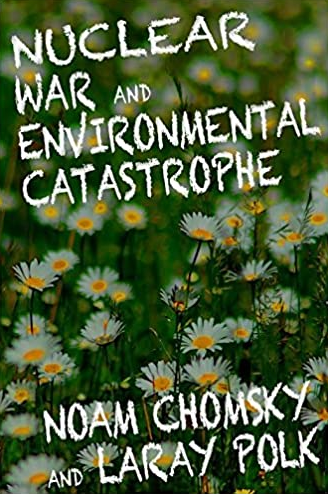Newly released
This book is new and will be uploaded as soon as it becomes available to us and if we secure the necessary publishing rights.

Nuclear War and Environmental Catastrophe Book PDF
(0)
Author:
Noam ChomskyNumber Of Reads:
61
Language:
English
Category:
fieldsSection:
Pages:
150
Quality:
excellent
Views:
627
Quate
Review
Save
Share
Book Description
“There are two problems for our species’ survival—nuclear war and environmental catastrophe, ” says Noam Chomsky in this new book on the two existential threats of our time and their points of intersection since World War II. While a nuclear strike would require action, environmental catastrophe is partially defined by willful inaction in response to human-induced climate change. Denial of the facts is only half the equation. Other contributing factors include extreme techniques for the extraction of remaining carbon deposits, the elimination of agricultural land for bio-fuel, the construction of dams, and the destruction of forests that are crucial for carbon sequestration. On the subject of current nuclear tensions, Chomsky revisits the long-established option of a nuclear-weapon-free zone (NWFZ) in the Middle East, a proposal set in motion through a joint Egyptian Iranian General Assembly resolution in 1974. Intended as a warning, Nuclear War and Environmental Catastrophe is also a reminder that talking about the unspeakable can still be done with humor, with wit and indomitable spirit.
Noam Chomsky
Fram Noam Chomsky (born December 7, 1928 Philadelphia, Pennsylvania) is an American professor of linguist and philosopher, as well as cognitive scientist, logician, historian, critic, and political activist. He is Professor Emeritus of Linguistics in the Department of Linguistics and Philosophy at MIT, where he has worked for more than 50 years. In addition to his work in linguistics, Chomsky has written on war, politics, and the media and is the author of more than 100 books. According to the 1992 Art and Human Sciences Reference List, Chomsky was cited more than any living scholar from 1980 to 1992, and ranked as the eighth most cited reference ever in a list that includes the Bible, Karl Marx, and others. Chomsky has been described as a cultural preeminent, having been voted as the "world's leading intellectual" in a 2005 poll. Chomsky is also described as the "father of modern linguistics" and is considered a major figure in analytic philosophy. His work has influenced fields such as computer science, mathematics, and psychology. . He is also credited with establishing the theory of generative grammar, which is often considered the most important contribution to the field of theoretical linguistics in the twentieth century. He is also credited with establishing what became known as the Chomsky hierarchy, the theory of universal grammar, and the Chomsky-Schützenberger theory. After the publication of his first book on linguistics, Chomsky became a prominent critic of the Vietnam War and has since continued to publish his critical books on politics. He is best known for his criticism of US foreign policy, state capitalism, and the general news media. His criticism of the media, which he co-wrote with Edward Hermann, is included in The Deference Industry: The Political Economy of Mass Media (1988) is an analysis that crystallizes a theory of the propaganda model for the study of media. Chomsky describes his views as "fairly anarcho-traditionalism with its origins in the Enlightenment and classical liberalism" sometimes identified with anarcho-syndicalism and libertarian socialism. He is also considered a key theoretician of the left wing of American politics. He is also credited with establishing what became known as Chomsky's hierarchy, a classification of formal languages according to their generative capacity. In addition to his work in linguistics, Chomsky is widely known as a political activist, and for his criticism of the foreign policy of the United States and other governments. Chomsky describes himself as a libertarian socialist, a sympathetic anarchist who is a member of the world's industrial workers' union and is often considered a key theorist of the left wing of American politics. According to the Arts and Humanities Reference Index, between 1980 and 1992 Chomsky was cited as a reference more than any other living person, and as the eighth person ever.
Book Currently Unavailable
This book is currently unavailable for publication. We obtained it under a Creative Commons license, but the author or publisher has not granted permission to publish it.
Rate Now
5 Stars
4 Stars
3 Stars
2 Stars
1 Stars
Nuclear War and Environmental Catastrophe Quotes
Top Rated
Latest
Quate
Be the first to leave a quote and earn 10 points
instead of 3
Comments
Be the first to leave a comment and earn 5 points
instead of 3